人教版九年级全册 Unit 6 When was it invented? Section B 2a-2e 课件 (共16张PPT)
文档属性
| 名称 | 人教版九年级全册 Unit 6 When was it invented? Section B 2a-2e 课件 (共16张PPT) | 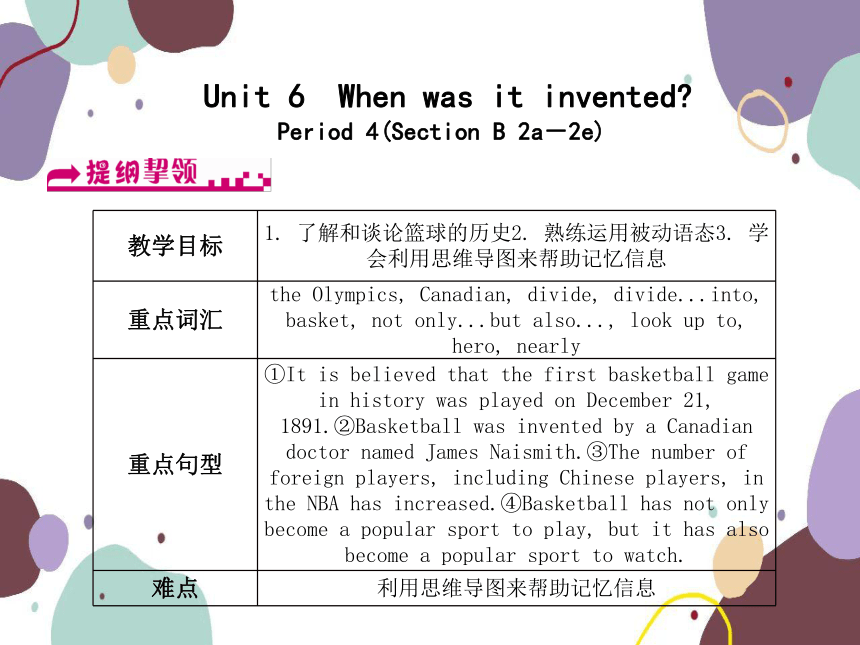 | |
| 格式 | pptx | ||
| 文件大小 | 229.4KB | ||
| 资源类型 | 教案 | ||
| 版本资源 | 人教新目标(Go for it)版 | ||
| 科目 | 英语 | ||
| 更新时间 | 2022-10-15 21:02:15 | ||
图片预览

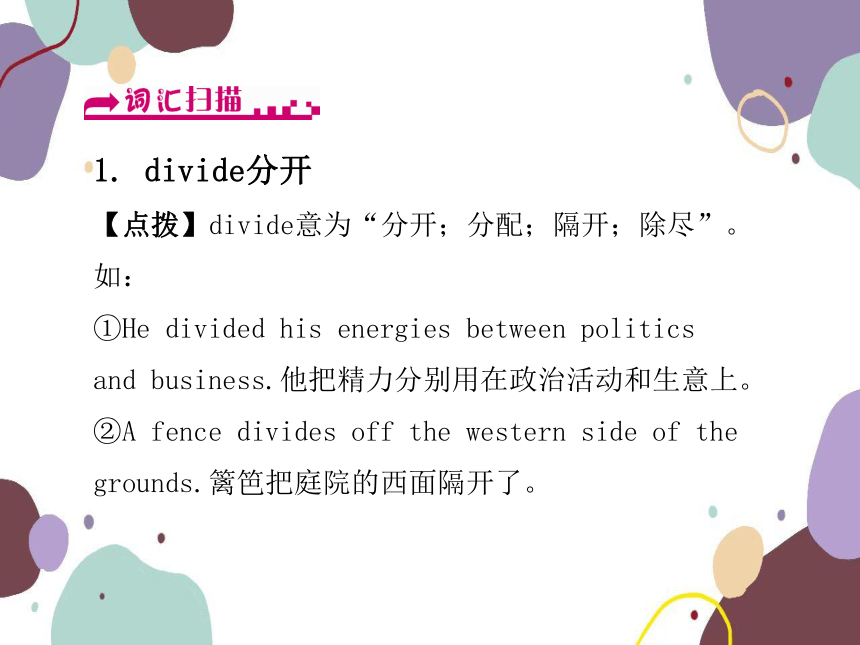
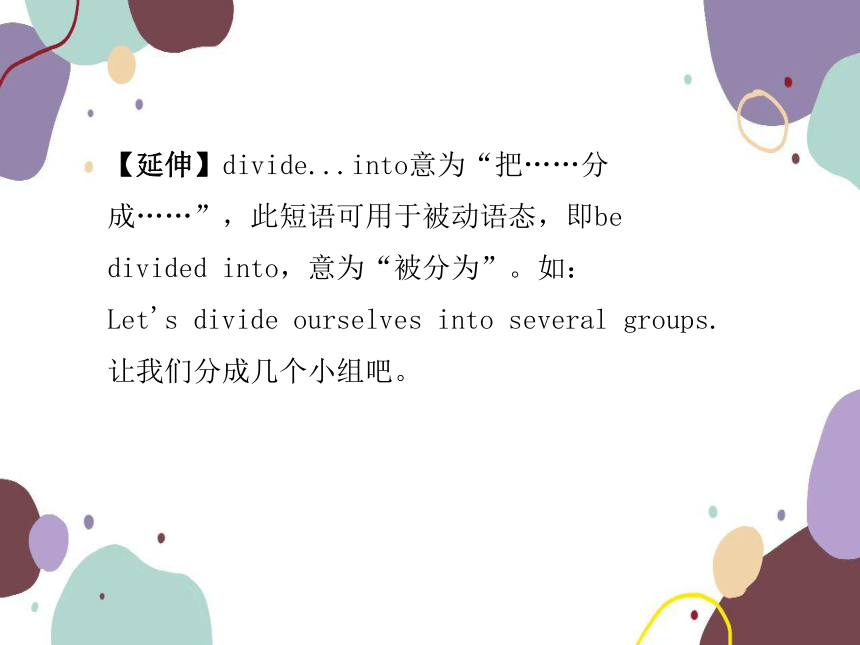
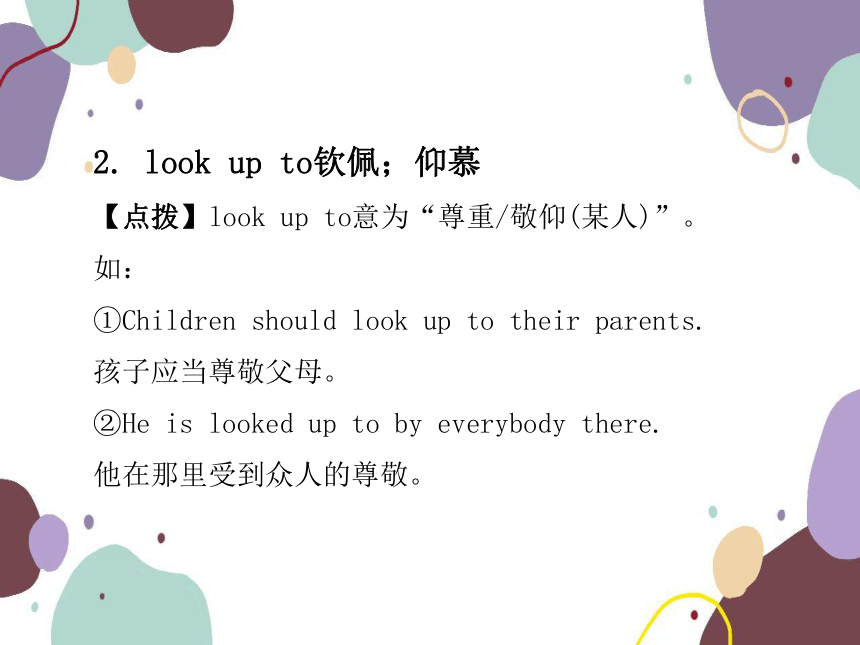
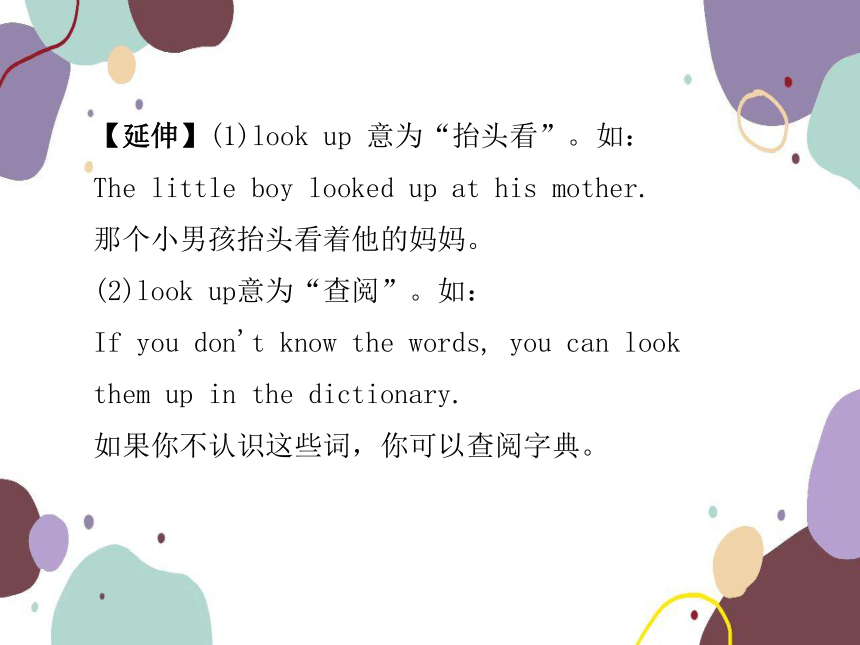
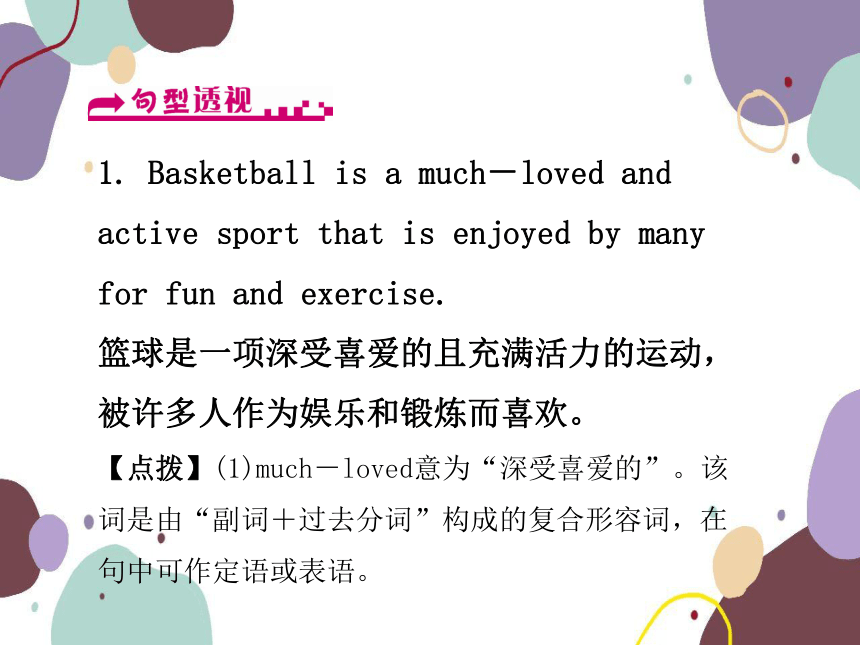

文档简介
(共16张PPT)
Unit 6 When was it invented
Period 4(Section B 2a-2e)
教学目标 1. 了解和谈论篮球的历史2. 熟练运用被动语态3. 学会利用思维导图来帮助记忆信息
重点词汇 the Olympics, Canadian, divide, divide...into, basket, not only...but also..., look up to, hero, nearly
重点句型 ①It is believed that the first basketball game in history was played on December 21, 1891.②Basketball was invented by a Canadian doctor named James Naismith.③The number of foreign players, including Chinese players, in the NBA has increased.④Basketball has not only become a popular sport to play, but it has also become a popular sport to watch.
难点 利用思维导图来帮助记忆信息
1. divide分开
【点拨】divide意为“分开;分配;隔开;除尽”。如:
①He divided his energies between politics and business.他把精力分别用在政治活动和生意上。
②A fence divides off the western side of the grounds.篱笆把庭院的西面隔开了。
【延伸】divide...into意为“把……分成……”,此短语可用于被动语态,即be divided into,意为“被分为”。如:
Let's divide ourselves into several groups.
让我们分成几个小组吧。
2. look up to钦佩;仰慕
【点拨】look up to意为“尊重/敬仰(某人)”。如:
①Children should look up to their parents.
孩子应当尊敬父母。
②He is looked up to by everybody there.
他在那里受到众人的尊敬。
【延伸】(1)look up 意为“抬头看”。如:
The little boy looked up at his mother.
那个小男孩抬头看着他的妈妈。
(2)look up意为“查阅”。如:
If you don't know the words, you can look them up in the dictionary.
如果你不认识这些词,你可以查阅字典。
1. Basketball is a much-loved and active sport that is enjoyed by many for fun and exercise.
篮球是一项深受喜爱的且充满活力的运动,被许多人作为娱乐和锻炼而喜欢。
【点拨】(1)much-loved意为“深受喜爱的”。该词是由“副词+过去分词”构成的复合形容词,在句中可作定语或表语。
如:
Her much-loved brother lay dying of AIDS.
她至爱的兄弟因艾滋病而濒临死亡。
(2)active是形容词,意为“活泼的;积极的”,可作表语和定语。常用短语:take an active part in,意为“积极参加”。如:
①Although he is over 80, he is still very active.他虽然年过80,但还是很活跃。
②We all take an active part in the sports meeting.我们都积极参加运动会。
【延伸】active的名词形式为activity,副词形式为actively。如:
①There are many outdoor activities for us to choose.
有很多户外活动可供我们选择。
②They are studying actively.
他们正在积极地学习。
2. Today, the popularity of basketball has risen around the world, with many young people dreaming of becoming famous players.
今天,篮球运动已经在世界范围内普及开来,许多年轻人梦想着成为著名的运动员。
【点拨】dream既可作及物动词,也可作不及物动词,意为“梦想;做梦;梦见”。常用短语:dream about/of,意为“梦想……;向往……”。
如:①Do you often dream at night
你晚上经常做梦吗?
②The boy dreams about/of becoming a scientist.那个男孩梦想成为一名科学家。
③I dreamed a strange dream.
我做了一个奇怪的梦。
【注意】dream后不能接动词不定式作宾语。如:
He dreams of becoming a pilot.(正)
他梦想成为一名飞行员。
He dreams to become a pilot.(误)
3. The number of foreign players, including Chinese players, in the NBA has increased.
美国职业篮球联赛外国球员的数量,包括中国球员有所增加。
【点拨】(1)including是介词,意为“包括”。如:
There are many places of great interest in China, including the Great Wall and the Summer Palace.中国有很多名胜古迹,包括长城和颐和园。
【延伸】include是动词,意为“包括”。如:
The plan includes most of your suggestions.
这项计划包括了你的大部分建议。
【点拨】(2)the number of意为“……的数目/数量”,后接复数名词,作主语时谓语动词要用单数形式。如:
The number of the students in the room is seventeen.
房间里的学生人数是17。
【辨析】the number of与a number of
the number of意为“……的数量”,中心词是number,指的是of后面名词的数量,谓语动词要用单数;a number of意为“许多……”,中心词是这个短语所修饰的复数名词,故谓语动词用复数。如:
①The number of the students in our school is over 2,000.
我们学校的学生人数是两千多。
②A number of students are playing soccer on the playground.许多学生正在操场上踢足球。
4.These stars encourage young people to work hard to achieve their dreams.
这些明星激励着年轻人为实现他们的梦想而努力奋斗。
【点拨】(1)encourage sb. to do sth.意为“鼓励某人做某事”。如:
The teacher often encourages us to study hard.
老师经常鼓励我们要努力学习。
【延伸】(1)encourage sb. in sth.意为“在……方面鼓励某人”。如:
My parents have always encouraged me in my choice of career.
在我选择职业时,父母总是鼓励我。
(2)encouragement为名词,意为“鼓励;鼓舞”。如:
The teacher's words were a great encouragement to him.
老师的话对他而言是极大的鼓舞。
【点拨】(2)to achieve their dreams是不定式短语,作work hard的目的状语,意为“为了实现他们的梦想”。动词不定式作目的状语,通常意为“为了……”。如:
She got up early to catch the early bus.
为了赶早班公共汽车,她早早地起床了。
Unit 6 When was it invented
Period 4(Section B 2a-2e)
教学目标 1. 了解和谈论篮球的历史2. 熟练运用被动语态3. 学会利用思维导图来帮助记忆信息
重点词汇 the Olympics, Canadian, divide, divide...into, basket, not only...but also..., look up to, hero, nearly
重点句型 ①It is believed that the first basketball game in history was played on December 21, 1891.②Basketball was invented by a Canadian doctor named James Naismith.③The number of foreign players, including Chinese players, in the NBA has increased.④Basketball has not only become a popular sport to play, but it has also become a popular sport to watch.
难点 利用思维导图来帮助记忆信息
1. divide分开
【点拨】divide意为“分开;分配;隔开;除尽”。如:
①He divided his energies between politics and business.他把精力分别用在政治活动和生意上。
②A fence divides off the western side of the grounds.篱笆把庭院的西面隔开了。
【延伸】divide...into意为“把……分成……”,此短语可用于被动语态,即be divided into,意为“被分为”。如:
Let's divide ourselves into several groups.
让我们分成几个小组吧。
2. look up to钦佩;仰慕
【点拨】look up to意为“尊重/敬仰(某人)”。如:
①Children should look up to their parents.
孩子应当尊敬父母。
②He is looked up to by everybody there.
他在那里受到众人的尊敬。
【延伸】(1)look up 意为“抬头看”。如:
The little boy looked up at his mother.
那个小男孩抬头看着他的妈妈。
(2)look up意为“查阅”。如:
If you don't know the words, you can look them up in the dictionary.
如果你不认识这些词,你可以查阅字典。
1. Basketball is a much-loved and active sport that is enjoyed by many for fun and exercise.
篮球是一项深受喜爱的且充满活力的运动,被许多人作为娱乐和锻炼而喜欢。
【点拨】(1)much-loved意为“深受喜爱的”。该词是由“副词+过去分词”构成的复合形容词,在句中可作定语或表语。
如:
Her much-loved brother lay dying of AIDS.
她至爱的兄弟因艾滋病而濒临死亡。
(2)active是形容词,意为“活泼的;积极的”,可作表语和定语。常用短语:take an active part in,意为“积极参加”。如:
①Although he is over 80, he is still very active.他虽然年过80,但还是很活跃。
②We all take an active part in the sports meeting.我们都积极参加运动会。
【延伸】active的名词形式为activity,副词形式为actively。如:
①There are many outdoor activities for us to choose.
有很多户外活动可供我们选择。
②They are studying actively.
他们正在积极地学习。
2. Today, the popularity of basketball has risen around the world, with many young people dreaming of becoming famous players.
今天,篮球运动已经在世界范围内普及开来,许多年轻人梦想着成为著名的运动员。
【点拨】dream既可作及物动词,也可作不及物动词,意为“梦想;做梦;梦见”。常用短语:dream about/of,意为“梦想……;向往……”。
如:①Do you often dream at night
你晚上经常做梦吗?
②The boy dreams about/of becoming a scientist.那个男孩梦想成为一名科学家。
③I dreamed a strange dream.
我做了一个奇怪的梦。
【注意】dream后不能接动词不定式作宾语。如:
He dreams of becoming a pilot.(正)
他梦想成为一名飞行员。
He dreams to become a pilot.(误)
3. The number of foreign players, including Chinese players, in the NBA has increased.
美国职业篮球联赛外国球员的数量,包括中国球员有所增加。
【点拨】(1)including是介词,意为“包括”。如:
There are many places of great interest in China, including the Great Wall and the Summer Palace.中国有很多名胜古迹,包括长城和颐和园。
【延伸】include是动词,意为“包括”。如:
The plan includes most of your suggestions.
这项计划包括了你的大部分建议。
【点拨】(2)the number of意为“……的数目/数量”,后接复数名词,作主语时谓语动词要用单数形式。如:
The number of the students in the room is seventeen.
房间里的学生人数是17。
【辨析】the number of与a number of
the number of意为“……的数量”,中心词是number,指的是of后面名词的数量,谓语动词要用单数;a number of意为“许多……”,中心词是这个短语所修饰的复数名词,故谓语动词用复数。如:
①The number of the students in our school is over 2,000.
我们学校的学生人数是两千多。
②A number of students are playing soccer on the playground.许多学生正在操场上踢足球。
4.These stars encourage young people to work hard to achieve their dreams.
这些明星激励着年轻人为实现他们的梦想而努力奋斗。
【点拨】(1)encourage sb. to do sth.意为“鼓励某人做某事”。如:
The teacher often encourages us to study hard.
老师经常鼓励我们要努力学习。
【延伸】(1)encourage sb. in sth.意为“在……方面鼓励某人”。如:
My parents have always encouraged me in my choice of career.
在我选择职业时,父母总是鼓励我。
(2)encouragement为名词,意为“鼓励;鼓舞”。如:
The teacher's words were a great encouragement to him.
老师的话对他而言是极大的鼓舞。
【点拨】(2)to achieve their dreams是不定式短语,作work hard的目的状语,意为“为了实现他们的梦想”。动词不定式作目的状语,通常意为“为了……”。如:
She got up early to catch the early bus.
为了赶早班公共汽车,她早早地起床了。
同课章节目录
- Unit 1 How can we become good learners.
- Section A
- Section B
- Unit 2 I think that mooncakes are delicious!
- Section A
- Section B
- Unit 3 Could you please tell me where the restroom
- Section A
- Section B
- Unit 4 I used to be afraid of the dark.
- Section A
- Section B
- Unit 5 What are the shirts made of?
- Section A
- Section B
- Review of Units 1-5
- Unit 6 When was it invented?
- Section A
- Section B
- Unit 7 Teenagers should be allowed to choose their
- Section A
- Section B
- Unit 8 It must belong to Carla.
- Section A
- Section B
- Unit 9 I like music that I can dance to.
- Section A
- Section B
- Unit 10 You're supposed to shake hands.
- Section A
- Section B
- Review of Units 6-10
- Unit 11 Sad movies make me cry.
- Section A
- Section B
- Unit 12 Life is full of the unexpected
- Section A
- Section B
- Unit 13 We're trying to save the earth!
- Section A
- Section B
- Unit 14 I remember meeting all of you in Grade 7.
- Section A
- Section B
- Review of Units 11-14
